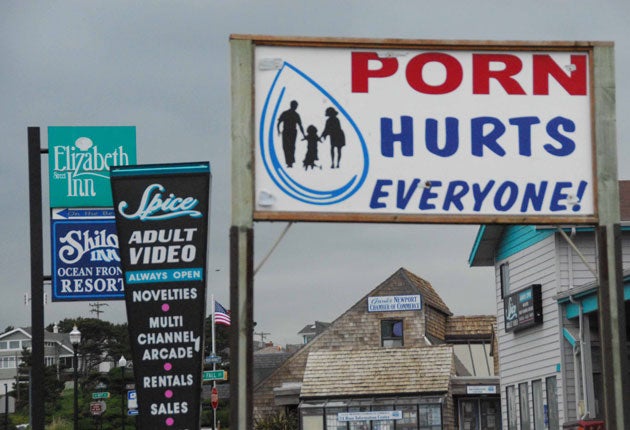Rhodri Marsden: Can a domain name clean up the web?

Pornography is the elephant in the room, as the old Joni Mitchell song doesn't go.
Actually, to say that it's the elephant in the room doesn't do justice to its overwhelming dominance of the internet; it's more like the mammoth in the porch, although it may be a while before that particular phrase gains common currency. But online pornography is certainly a subject that's rarely talked about, bearing in mind that it's the pre-eminent internet money-spinner, and that everyone spends a disproportionate amount of time either trying to avoid it or access it, depending on their moral standpoint and taste. And that's probably why many people were looking around nervously and muttering on hearing the news that a new top-level domain, .xxx, will soon be sitting alongside .com, .net and .org.
"Fury as every internet pornography site to get .xxx domain name" screeched the Daily Mail, in a characteristically confused reading of the story. And the internet community began to wonder: will this make pornography more of an online menace? Will it effectively police a burgeoning and exploitative industry? Will my friend's proclivity towards images of bearded men in thongs bending over Black & Decker Workmates be encouraged, threatened, driven underground? Will people discover that when I refer to my friend's proclivities, I'm actually referring to my own? All these questions – along with many unprintable ones – began to float to the surface.
And the answer to them all is: "Well, no." The effect upon the pornographic status quo (and there's an image to erase hurriedly from your mind) is set to be nil. The move doesn't oblige pornographers to move their content to an easily-filterable .xxx section of the internet – although that will now be the inevitable aim of conservative groups in the USA, and will be a niggling concern for the porn business should the Christian right come to power in the USA. So, it won't make pornography any easier to keep off the family computer, because most of it will stay in the same online location. It will have no effect on anyone's ability to find pornography, because most locating happens via search engines, and the domain name of a website isn't as important a factor. Conservative groups are upset about the idea of .xxx somehow legitimising pornography, but in objecting to it they've found themselves aligned with the adult entertainment industry they despise, who don't want to be ghettoised. In short, hardly anyone wants it.
Except, of course, the company who have been lobbying ICANN, the overseeing body of internet domain names, to allow them to administer and make money from .xxx. It's called ICM, it'll charge $60 a year for a domain, and despite donating $10 of that to a non-profit body to promote "responsible business practises", it'll still coin it – and not just from porn sites trying to protect their brand, but also from companies and individuals who will feel obliged to snap up bbc.xxx or britneyspears.xxx to avoid potential embarrassment. While ICM's case for .xxx was strong on paper, and was approved by ICANN after much wrangling because of an obligation that it has to be "neutral", it's essentially a way of making money from porn without making porn. Which is all very clever, but for those who take a dim view of the industry, it's just as morally dubious as writing the cheques, holding the camera, or bending over the Black & Decker.
***
Facebook introduced a face recognition system this week – but don't worry, it's quite benign; it just means that when you upload photos to your account, the system recognises which bits of the photo are faces, draws neat little boxes around them and prompts you to tag them with your friends names, should you so wish to do so. But you can see what's lurking on the horizon; Google's Picasa software is already intelligent enough to recognise all my photos of my ex-girlfriend and group them together in a handy folder, and you get the feeling that the only reason a similar thing hasn't been deployed on Facebook is that it'll freak people the hell out, as teenagers are prone to exclaim.
But according to research done by Adam Harvey, a graduate student at NYU, wearing unusual make-up or a sticker "breaks apart the gestalt of the face" and prevents such systems from working. So, in future, it will be possible to outwit Google or Facebook – hooray! – but you'll have to make yourself look like Aladdin Sane-era David Bowie to do so.
Join our commenting forum
Join thought-provoking conversations, follow other Independent readers and see their replies
Comments